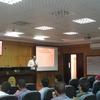Incubation Temperature and growth performance
Influence of Egg Shell Embryonic Incubation Temperature and Broiler Breeder Flock Ageon Posthatch Growth Performance and Carcass Characteristics
Published: November 23, 2010
Summary
A study was conducted to examine the conversion were determined at 21, 35, and 44 d of age. Body weight of birds from the H treatment was signifi- posthatch growth performance of high-yielding broilers cantly less at 21, 35, and 44 d compared with the M birds. when eggs were incubated at 3 different embryo tempera- Birds in the L group weighed significantly less at 35 and tures from 2 ocks of bre...
Related topics:
Authors:
Recommend
Comment
Share
24 de noviembre de 2010
A very good research. Although we know the importance of temperature and its influence during the life cycle of poultry but this excellent research demonstrated that higher temperature or uneven temperature, even, during incubation could result in adverse results. Other issue that require attention during hatching procedure in proper circulation of air inside incubator, fresh air should reach every corner of the machine so that excessive heat could be removed from the eggs. This article demonstrates that with proper management to control heat and circulation inside incubator would result in better performance, not only at hatching but also after during growth of the bird.
Recommend
Reply
24 de noviembre de 2010
The author discussed very important issue about chick quality. The variation in egg weight of a flock also affect chick quality. The subsequent performance of chick also depend on the machines have single stage or multistage settings.
Recommend
Reply
1 de diciembre de 2010
The researcher acually put the importance of temperature during egg incubation and its affects on post hatching chickes . I woud to add that the level of carbon dioxied
during the incubation and hatching especially at high tempreature has effec on hathability and weight of chickes and its performance after hathing
Recommend
Reply
10 de diciembre de 2010
I am very much thankful to the Author for sharing his case study on Engormix. Its a
self explainatory that how Hatching temperature & Egg size affect the performance
of pulled out chicks at commercial farm level.
Thanks & regards
Dr Jaydip
Recommend
Reply
Recommend
Reply
3 de enero de 2011
Very good research on the incubation temperature and posthatch charecteristics of broiler.
Recommend
Reply
Recommend
Reply
1

Would you like to discuss another topic? Create a new post to engage with experts in the community.




















